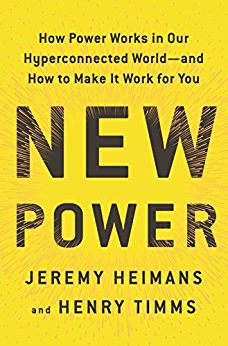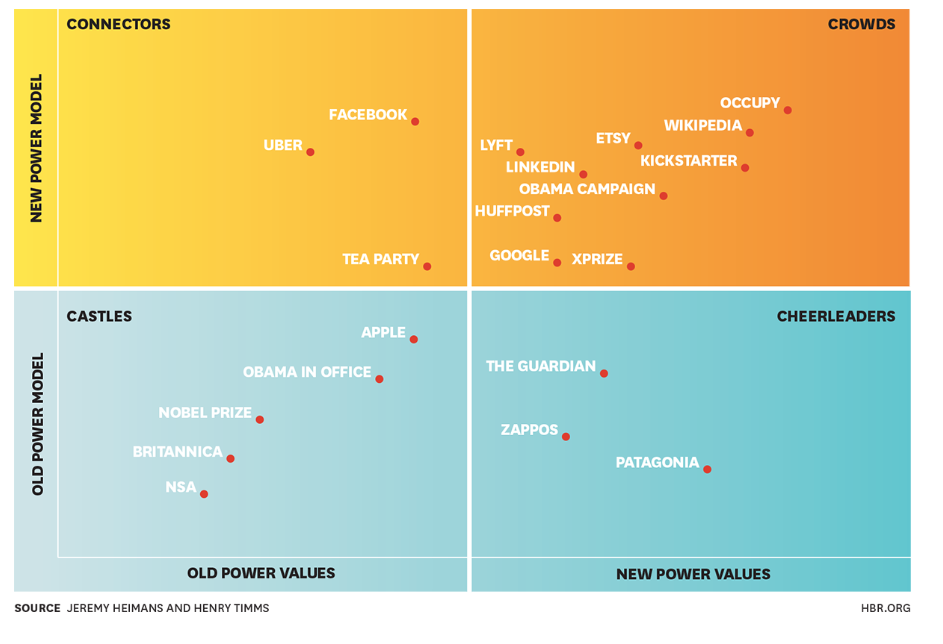You have /5 articles left.
Sign up for a free account or log in.
 New Power: How Power Works in Our Hyperconnected World and How to Make It Work for You by Jeremy Heimans and Henry Timms
New Power: How Power Works in Our Hyperconnected World and How to Make It Work for You by Jeremy Heimans and Henry Timms
Published in April of 2018
I’m old power. I have old power values. And I work in an old power model.
This is one of the things that I learned by reading New Power: How Power Works in Our Hyperconnected World and How to Make It Work for You.
A quick way to situate where you and the institution / organization that you work on the new power compass is to check out the matrix below. (Stolen from the HBR article in which the book grew out of):

https://hbr.org/2014/12/understanding-new-power
The realization that I’ve spent my life in “Castles” hit me sort of hard. (My only non higher ed gig was at Britannica).
Last week I spent a few days at ASU’s EdPlus unit. EdPlus is the learning innovation and online education unit of ASU. It is an institution whose culture most closely embodies new power values.
Old power values stress managerialism, institutionalism, and representative governance.
New power values are more about informal and opt-in decision making.
Old power institutions put exclusivity, competition, specialization, and long-term affiliation and loyalty at the center their world views.
In contrast, new power institutions follow practices aligned with open source collaboration, transparency, and the privileging of overall participation even at the cost of short-term and conditional affiliations.
Where would you place your institution on the new power / old power spectrum?
What is really good about a book length treatment of new power vs. old power is that the authors have the time and space to bring nuance and some gray areas to their story. New power is not always superior to old power. New power techniques such as crowd mobilization and decentralized messaging control have been effectively adopted by both the NRA and the Trump campaign.
When it comes to higher education, there is an important place for new power values and practices. The teams at EdPlus are completely mission driven to bring in to reality the ASU Charter. This Charter lets us know that ASU measures itself “... not by whom it excludes, but by whom it includes and how they succeed”. EdPlus is using every lever at its disposal, including online and open education, to meet this new power value of radical inclusion. (EdPlus also practices radical transparency, constantly hosting visitors from across the global higher ed world, and honestly sharing what is working and what is not).
Reading New Power will also give you some appreciation to the old power values of traditional higher education. Old power values can create institutions that are durable, resilient, and optimized for specific missions. The crowd may want only an education that prepares them for the highest possible salary on the first day after graduation. An old power institution may take a longer view, believing that the true value of an education is the ability to learn how to learn - and to develop the skills and habits of lifetime leadership. Alternative credentials is new power. The slow and painful search for wisdom is in the old power wheelhouse.
In reading New Power, I kept thinking about how traditional old power institutions (the Castles) might adopt some new power values - while preserving what is essential. Heimans and Timms suggest that the answer is to go “bilingual”. To develop connections, networks, and affiliations with new power players - to learn to speak their language - while not abandoning the good things of an old power orientation.
Connecting the new and old power higher ed world’s can be difficult. The sheer scale of new power organizations - and new power higher education - is daunting. Still, the insistence of old power colleges on the value of the small scale learning, driven by a scholar-educator model of teaching, is valuable for all of higher education. We can admire the practices and methods of an Amazon or an Airbnb, but we shouldn’t all follow their examples.
New Power is a book that will make you think critically about where your institution fits into the future of higher education. Of course, there are other ways to read this book then only through a higher ed lens. Those interested in why ISIS has been so successful in recruiting, why the Ice Bucket Challenge raised so much money, and why we all go the 2016 election so wrong will also find much to ponder in this absorbing and fast-paced book.
I, of course, prefer to read New Power through a higher ed lens. And like many books that are not at all about higher education, we can learn the most about our world by leaving it for a while.
What books can you recommend that are not about higher education, but that taught you something surprising about academia?
What are you reading?








